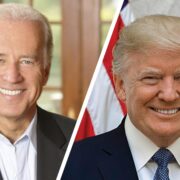
Leading up to the conventions for both the Democratic and Republican parties, early data found that Asian Americans are leaning left with 54% saying they are inclined to vote for former Vice President Joe Biden.
In preliminary data from the 2020 Asian American Voter survey — conducted by APIAVote, AAPIData, Asian Americans Advancing Justice | AAJC — about half of registered voters surveyed from July 4 to August 16 threw their support for the Democratic nominee, while 29% of respondents said they favor another four years under President Donald Trump.
(The results come from about 850 respondents from the top six Asian American groups, including Filipino American.)
Meanwhile, 16% are still undecided, which may present an opportunity for both parties to court these voters.
Going into this election cycle, Asian Americans are the fastest-growing segment of eligible voters out of the major racial and ethnic groups in the United States with 11.1 million, or 5% of the nation’s eligible voters, able to vote, according to a Pew Research Center analysis released in May.
Early data from the voter survey, however, found that a majority of Asian Americans have not had contact from either major party — 56% reported “not at all” in terms of being contacted by the Democratic Party, while 59% said none from the Republican side.
“One of the reasons why Asian Americans are less likely to get contacted during the presidential election years is that they’re less likely to live in battleground states,” Karthick Ramakrishnan, UC Riverside professor and founder of AAPI Data, said in a virtual non-partisan event on mobilizing AAPI voters ahead of the Republican National Convention on Monday, August 24.
During the 2016 presidential election cycle, results from the group’s survey found that 70% of respondents said they were not contacted by either party.
“Even though there has been progress, even in those battleground states — either because of a perceived difficulty or actual lack of staffing in these campaigns —they’re less likely to reach out to the Asian American population,” Ramakrishnan added.
AAPI political agenda
Despite the Asian American and Pacific Islander population not being a monolith, the issue around inclusion seemingly has consensus among the various groups. One of the ways the community has been civically engaged is through debates about affirmative action, for example.
“As we see in these kind of broad topics, we can start to identify an Asian American agenda. A majority support fairly robust immigrant rights for both a U.S.-born population and an undocumented population. There’s also a consensus around the need for access to in-language materials for those who are not in-English dominant. And then of course, we’ve seen a fair amount of support for increased representation in entertainment and in corporate leadership where there has been a ceiling on Asian American promotion,” Janelle Wong, a professor at the University of Maryland, said on Monday.
Wong added that it’s been a “stereotype” that the issues that Asian Americans are largely about are confined to education or immigration because of the majority still being foreign-born.
However, the polling group said that the community has shown large support for gun control, environmental protection, universal health care and Black Lives Matter.
Anecdotally, speakers at Monday’s event believe that the rise of anti-Asian hate crimes in light of the COVID-19 pandemic may be an impetus for increased political engagement this time around.
The full results of the 2020 Asian American Voter survey are slated to be released in September. (AJPress)






